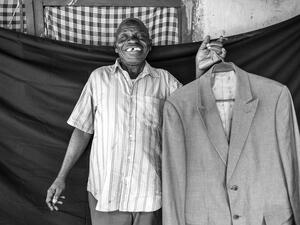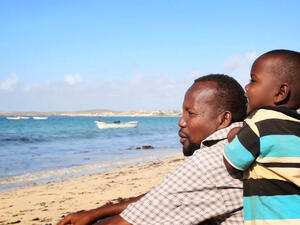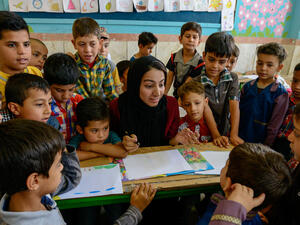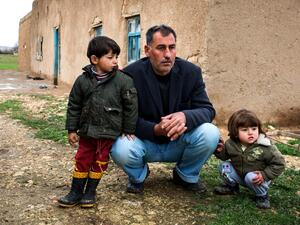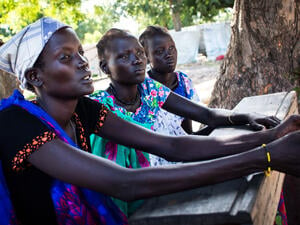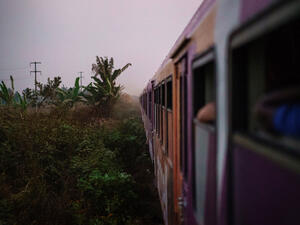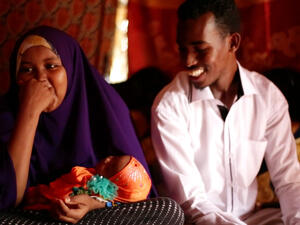Sharp rise in returns to Burundi, says UNHCR
Sharp rise in returns to Burundi, says UNHCR

A convoy of three buses and 12 trucks carrying 498 Burundian refugees and their belongings back from Tanzania's Kasulu camp stops at the Mugina border crossing on August 11, 2005.
MABANDA, Burundi, August 12 (UNHCR) - Night after night, for many tedious years in a Tanzanian refugee camp, Burundian refugee Salvator Gasage and dozens of his friends huddled around his prized FM radio, waiting for just one piece of news: that it was now safe to go back to his homeland, a tiny country long ravaged by war.
On Thursday, clutching his large radio in a dusty cloth carrier case he had lovingly made for it, the 70-year-old finally set foot again on Burundian soil.
"I am very happy," he said with a broad smile. "I came home with the aid of God. I thank God for letting me come home."
Orderly communal elections held in Burundi at the end of June were the signal Gasage - and thousands of other Burundian refugees - had been waiting for.
"We are seeing a dramatic increase in the number of Burundian refugees returning home from camps in Tanzania - an expression of their confidence that peace has now come to Burundi for good," UNHCR spokeswoman Jennifer Pagonis told journalists in Geneva on Friday.
Whereas in June and July the number of Burundians coming home to the south of the country was in the range of 600 to 800 a week, this week alone the UN refugee agency helped more than 4,200 come home to three southern provinces - 3,600 from Tanzania and 600 from Rwanda.
For August, the agency estimates that the number who will come home to this area on UNHCR convoys will total 20,000 - a more than six-fold increase over the 3,116 who came home in June. Since 2002, more than 255,000 Burundian refugees have gone home, mainly from Tanzania.
Although UNHCR is not actively promoting return to Burundi, the agency does supply transportation from the Tanzanian camps to returnees' home villages. Returnees also get help in restarting life in their homeland, with a three-month supply of food, as well as plastic sheeting, mats, blankets, cloth, sanitary materials, jerry cans, soap and a hoe, since most of them are farmers.
The communal elections - virtually the last step in a long transition to full peace and democracy - emboldened many refugees.
"Yes, yes, the elections," said Rosatta Nyabenda, a 44-year-old widow who came home with her four children on a UNHCR convoy on Thursday. "I listened to the radio with others and the elections have raised our confidence. If we didn't have confidence, we wouldn't have come home."
She said each refugee has to make a personal decision based on "how one perceives the situation. I couldn't wait till next month. I felt I had to come home right now. I came home because there is peace. That's all."
Although her husband died of illness during her nine years in exile, she is facing the future with confidence. At her feet is a tattered cardboard carton with a few chickens inside - the heritage of a profitable small business she ran in the camp in Tanzania, and her seed capital for a new life in Burundi.
"If it's possible, I'll become a farmer," she said, adding that she has no family other than her children, and only hopes for help from other returnees. "My family is the people I came home with."
Nyabenda and Gasage were two of 498 Burundians who came home Thursday from Kasulu camp in Tanzania, and their joy was obvious. Outward displays of emotions are rare in Burundi, yet most of the refugees burst into spontaneous songs of celebration as soon as they reached the Mugina border crossing.
At nearby Mabanda transit centre, they were welcomed by a Burundian government official who told them: "You left your country in difficult times and you know well that it's not easy to live in exile. Now you have come back to participate in the reconstruction of your country."
Calinie Bigirimana, a mother of six girls who listened to his words, agreed: "Things have changed in the last few months, because we have heard there are good relations between the authorities and the citizens. That is why we decided to come home now."
Gasage, the proud owner of the radio, has high hopes for the future, but has lived through too much to be thoroughly confident. "I just want a future of peace for my children," he says of his two boys, aged 13 and 16. "If there is no peace, there is no future."
And will his homeland remain peaceful?
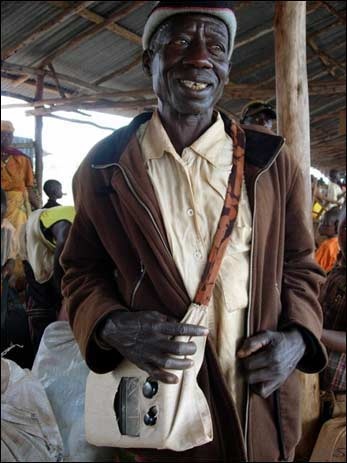
Fresh off the truck from Tanzania, returnee Salvator Gasage cradles his beloved FM radio, on which he heard the news that it is safe to return home to Burundi.
"In Burundi, you never know," says the 70-year-old with a shrug. "If peace doesn't last, we will go back to Tanzania."
There are still some 238,000 Burundian refugees in Tanzania's camps and another 198,000 in settlements in the west of the country.
By Kitty McKinsey in Mugina and Mabanda, Burundi



